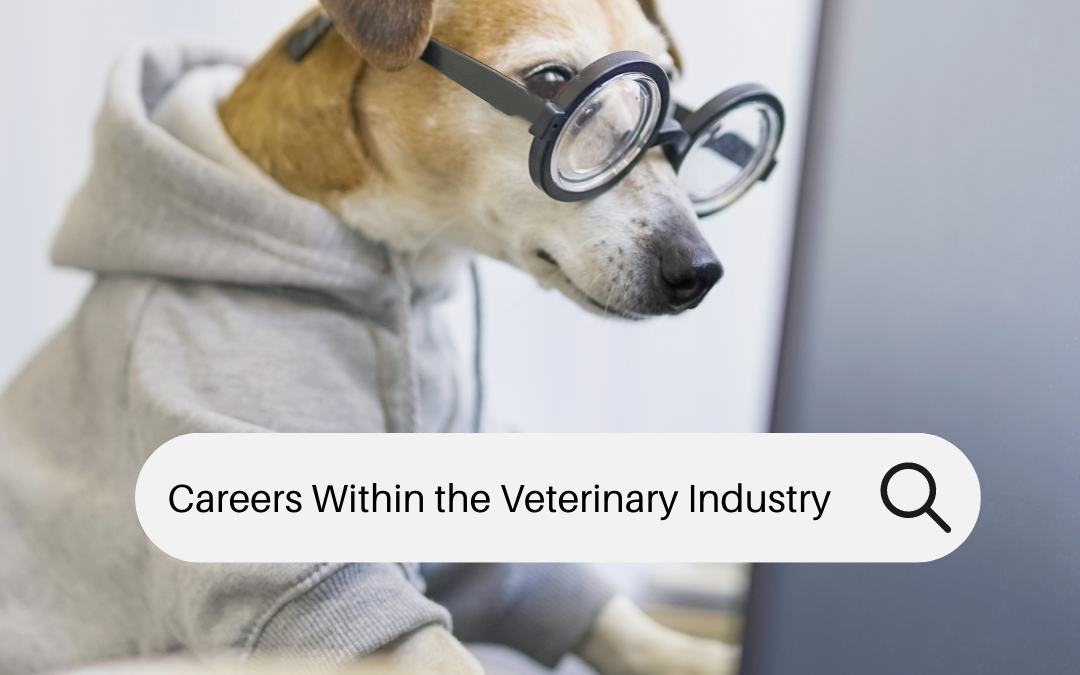Careers within the Veterinary Hospital
Are you an undergraduate debating a career path to take in the veterinary industry? Or are you a first or second-year veterinary student that is not quite sure which career path you want to track? Maybe you are in the veterinary industry and wanting a career path change? If you answered yes to any of these questions, this blog is for you. This blog covers different careers within the veterinary hospital. Every community, big or small, has livestock and pets in it. So, every community needs veterinary professionals to care for the animals in it. There are many types of veterinary professionals. After all, there is more than being JUST a veterinarian.
Veterinarian Professionals can wear many hats. They have jobs in government making sure that the nation’s food supply is safe. They may have a job working to control the spread of diseases. Veterinarians can also partake in research that helps animals as well as humans. After people graduate with their Doctorate of Veterinary Medicine, they gain more than medical skills. Likewise, veterinarians gain experience communicating, problem-solving skills, an approach for care in animal welfare and human well-being. Therefore, this makes them qualified for many different jobs.
What’s Available in the Hospital:
A veterinarian can wear many hats when they are working in the industry. Similarly, a person can have a degree in veterinary medicine and work in or outside a practice. A General Practitioner has trained to examine and treat common conditions such as chronic or acute, includes minor and severe cases. General Practitioners typically advise pet owners on general care knowledge. The general practitioner prescribes medicines to their patients and administers vaccinations to them as well. On the opposite end of the general practitioner is a Veterinary specialist. As described by AVMA, a veterinary specialist is “a veterinarian who has completed additional training in a specific area of veterinary medicine and has passed an examination that evaluates their knowledge and skills in that specialty.”
Some Examples:
- Dentists are veterinarians that specialize in the diagnosis and treatment of both dental and oral diseases.
- Emergency and Critical Care veterinarians only work in emergency settings or intensive care. The animals they care for are known for being the sickest or in need of the most care.
- There are individual specialties within internal medicine. Some of them include cardiology, neurology, oncology, and internal medicine itself.
- Cardiologists diagnose and treat conditions of the heart and circulatory system.
- Neurologists focus on the nervous system. They diagnose and treat problems or diseases with the brain, central nervous system, and other parts of the nervous system.
- Oncology is the study and treatment of tumors. Oncologists study and treat tumors and cancers.
- Internal Medicine specialists treat patients that have a disease or complication that affects multiple body systems at once.
- Nutrition specialists are responsible for clinical application and research of nutritional needs of animals in the hospital and a lab.
- A veterinary specialist that trained and practices all aspects of the eye is known as an Ophthalmologist.
- Pharmacologists study how medications affect animals and can administer them as well.
- Radiologist specialists have trained to use x-ray, ultrasound, computed tomography (CT), magnetic resonance imaging (MRI), and other procedures allowing veterinarians to see inside of a patient. Radiation Oncologists specialize in using radiotherapy to treat cancer.
- Surgeons are either certified in either small or large animal surgery. Many surgeons will have a focus on orthopedics, soft tissue surgery, or neurosurgery.
Different Career Options:
While it is a great career option to be a veterinarian, other options are available for careers within the veterinary hospital. If you choose not to go through veterinary school, you can become a veterinary assistant, technician, or technologist.
- Veterinary Assistants are people who assist the technician and veterinarian. When a person chooses this career, their training is as short as nine months. Their jobs can include caring for animals in the hospital while under the supervision of a technician or veterinarian. They can have other duties within the hospital as well. That is to say, dependent on the hospital.
- As a Veterinary Technician, a person completes a lot of tasks throughout the day. This position can be found performing digital X-rays, dental procedures, running blood tests, and monitoring patient vitals in the hospital. While this isn’t all they do, the tasks listed are four of the more prominent ones.
Technology that Helps Veterinary Careers:
Technology can be helpful in many of the categories that are listed above. Anesthesia is a common factor with almost all of the specialist categories. Consequently, with the use of anesthesia, some complications can come with it. Manual monitoring is in a lot of hospitals around the country. So, VetMeasure created a vital monitoring harness for veterinary hospitals to help the staff. In the past year, there has been a large influx of patients in veterinary hospitals. A previous blog talks about this in-depth. MeasureON! smart harness that can track heart rate, respiratory rate, and temperature. It can also stream a live ECG.
MeasureON! is designed to measure the vitals of canine patients around the thoracic region of the animal, which makes it the most accurate smart harness on the market. This harness sends alerts to the veterinary specialists and veterinary staff in the hospital if a patient is outside of the safe ranges. Safe ranges on the harness can be set according to each patient, catering to their specific needs.
To sum it up, there are many career opportunities in the veterinary industry. A general practitioner, specialist, or career in the veterinary industry, without a DVM, are all options for a person in the industry. Every community, big or small, needs a hospital. Likewise, every community needs veterinary professionals to care for the animals in it. After all, there is more than being JUST a veterinarian.

